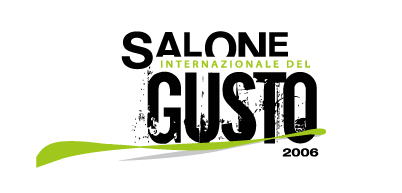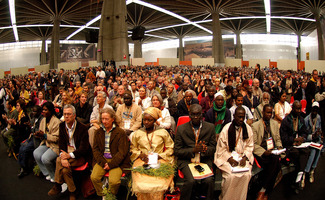
This would not be a good week to have dinner at Chez Panisse, Berkeley's temple of enlightened eating. Alice Waters and what seems like her entire crew are here in Turin, Italy, for the Salone del Gusto, a biannual gathering of the "global food village" put on by Slow Food.
Plenty of heavy-hitters. At the Theater of Taste tomorrow night, the Spanish super-chef Ferran Adria leads a workshop on, gulp, simple kitchen tricks; do they involve a hand-held blender? In one corner of the press room, Ruth Reichl of Gourmet, cell-phone under her curls, waves to a friend across the writers' carrels. Michael Pollan, America's voice for sustainable agriculture, is here for a panel on biodiversity. Harold McGee, the modest guru of kitchen science, is on another panel. Joan Nathan autographs a copy of her New American Cooking for a fan. The lone Seattle delegate in the semi-official delegation of 150 American chefs is Jonathan Sundstrom of Lark; haven't actually located him yet.
But it's more than just chefs and food writers. Hundreds of small organizations, representing artisanal producers from around the world, have sent delegations. They're the backbone of the conference, the men and women who till the soil, plant the seeds, milk the goats. Food communities from every continent, breeders, growers, educators. North San Juan Fruit Growers, Washington Chinook Fishermen, cidermakers, bread bakers, wine makers.
They have a serious agenda: to preserve and enhance fresh water supplies (for decent coffee, if nothing else!), to maintain a bank of genetically diverse seeds (not just what's industrially convenient), to keep the food supply lines as short as possible (local is better).
Their motto is "Good, Clean and Fair." Good because eating should be a pleasurable activity; clean because food should be produced without straining the planet's resources; fair because it should promote social justice.

Food authorities from around the globe at Terra Madre, Slow Food's "Mother Earth" symposium.
To complement the high-level food politics, hundreds of artisanal producers are exhibiting and selling their wares to tens of thousands of local visitors here at the sprawling Lingotto fairgrounds. It is, after all, a consumer event as well. Cheeses galore, a selection of 2,500 wines, glorious country hams and sausages, breads baked with flour milled from forgotten grains. Plenty of free samples, and tasting plates cost a modest two or three euros. (No pushing or shoving, though; it's not your voracious, self-centered Bite of Seattle crowd, for sure.)
You cannot leave here without a sense of optimism: the 20-year-old Slow Food movement is changing not just the way we think about food but how we deal with the planet.